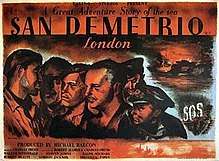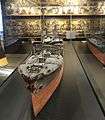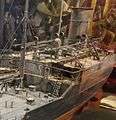San Demetrio London
San Demetrio London is a 1943 British World War II docudrama based on the true story of the 1940 salvage of the tanker MV San Demetrio by some of her own crew, who reboarded her after she had been set on fire by the German heavy cruiser Admiral Scheer and then abandoned, during the Battle of the Atlantic. The film was produced by Michael Balcon for Ealing Studios and directed by Charles Frend.
| San Demetrio London | |
|---|---|
 Original British quad format cinema poster | |
| Directed by | Charles Frend Robert Hamer (uncredited) |
| Produced by | Michael Balcon |
| Screenplay by | Charles Frend Robert Hamer F. Tennyson Jesse |
| Starring | Arthur Young Walter Fitzgerald Ralph Michael |
| Music by | John D. H. Greenwood |
| Cinematography | Ernest Palmer |
| Edited by | Eily Boland |
Production company | |
| Distributed by | Associated British Film Distributors (United Kingdom) 20th Century Fox (United States) |
Release date |
|
Running time | 104 minutes |
| Country | United Kingdom |
| Language | English |
Plot
The film is a reconstruction of the story of the salvage of the British tanker, MV San Demetrio. Carrying a cargo of oil home from Galveston, Texas, she was abandoned by her crew having been set on fire by shells from the German cruiser Admiral Scheer. Of the three lifeboats which escaped the damaged tanker, two were picked up by other ships. After drifting for three days, the occupants of the third, who included the chief engineer and the second officer, reboarded the burning San Demetrio, extinguished the fires, and, having managed to restart the engines, returned to Britain, sailing into the Clyde ten days later.[1]
Cast
- Arthur Young as Captain George Waite
- Walter Fitzgerald as Chief Engineer Charles Pollard
- Ralph Michael as 2nd Officer Hawkins
- Neville Mapp as 3rd Engineer Willey
- Barry Letts as Apprentice John Jones
- Michael Allen as Cadet Roy Housden
- Frederick Piper as Boatswain W.E. Fletcher
- Herbert Cameron as Pumpman Davies
- John Owers as Steward
- Gordon Jackson as Messboy John Jamieson
- Robert Beatty as "Yank" Preston
- Charles Victor as Deckhand
- James McKechnie as Deckhand
- John Coyle as Deckhand
- Duncan McIntyre as Deckhand (as Duncan MacIntyre)
- Rex Holt as Deckhand
- Mervyn Johns as Greaser John Boyle
- Lawrence O'Madden as Captain E.S.F. Fegen V.C. – HMS Jervis Bay
- James Donald as Gunnery Control Officer – HMS Jervis Bay
- James Sadler as Officer of the Watch – HMS Jervis Bay
- Peter Miller Street as Midshipman – HMS Jervis Bay
- David Horne as Mr. Justice Langton
- Nigel Clarke as R.J.E. Dodds – Shipping Manager
- James Knight as Captain Smith – SS Gloucester City
Production
Although Charles Frend is given sole credit as director, the film was completed by Robert Hamer after Frend became ill.[2] The San Demetrio's chief engineer, Charles Pollard, was employed as a special adviser.[3] Early film star Bessie Love, her acting prospects having declined, worked on this movie doing continuity, first as an assistant and towards the end of production taking over when the original "continuity girl" left to deliver a baby.[4]
Reception
According to trade papers, the film was a success at the British box office in 1944.[5] The Monthly Film Bulletin said that "In places the music is a trifle too strident; some of the model shots are less successful than others, but on the whole justice has been done to a great theme.[1]
The model used in the film is on display at the Imperial War Museum in London.
 Model made for film, view from front
Model made for film, view from front Model showing damage to central section
Model showing damage to central section Details of damage to stern as shown on model
Details of damage to stern as shown on model
References
- "San Demetrio London". Monthly Film Bulletin. 10 (120): 134. December 1943.
- San Demetrio London at the BFI's Screenonline
- "10 great battleship and war-at-sea films". British Film Institute. Retrieved 16 August 2016.
- Love, Bessie (1977). From Hollywood with Love: An Autobiography of Bessie Love. London: Elm Tree Books. pp. 132–6. OCLC 734075937.
- Murphy, Robert (1992). Realism and Tinsel: Cinema and Society in Britain 1939–48. London: Routledge. p. 207. ISBN 978-0-415-07684-5.